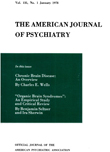Abstract
Heredity investigations, normal characterology, and clinical experience speak strongly in favor of the existence of well defined types of constitution that play an important role in pathology and criminology. By constitution is here meant the total psycho-biological outfit of an individual that is so fixed that it can scarcely be changed except by long-lasting psychical or physical influences.
The constitutional types most frequently met with in clinical psychiatry are the sensitive, the cyclothymic and schizoid, the hysterical, the compulsive, and the paranoic and paranoid constitutions. The author is personally of the opinion that the fundamental and central traits in all these character types are of hereditary origin and does not think that psychotherapy, even at an early stage, will have any great influence in changing these personalities, except perhaps in the hysterical and possibly the paranoic types. A common trait in all these constitutional types is the disposition to many neurotic as well as psychotic reactions, which can be understood either as exaggeration of the character traits in question or by assumption of the relatively simple psychodynamic processes of introjection, conversion, or projection. During life many psychoneurotic mechanisms may take place in these individuals and this is the reason that many of them may profit from psychotherapy.
The sensitive constitution is supposed by the author to be the basis for development of the simple depressive reactions, self-reference reactions, and inhibition reactions, as well as for several of the compulsive neuroses, that are not developed on the basis of a compulsive character.
In addition the author assumes that most of the paranoic reactions are also due to a hypersensitive constitution. While the symptoms in the sensitive neuroses are best explained by assuming a tendency toward introjection, in the paranoics we have to do with sensitive individuals with, probably, an inborn tendency toward projection. As to the relation between the hysterical character and the symptom formations in the hysterical neuroses, these are, as is generally agreed, best explained by the assumption of a tendency to convert the conflict into bodily symptoms. And as to the symptoms in the cycloid and schizoid characters, these are best explained as direct hereditary character traits, while the symptom formation in the reactive psychoses is best explained as an exaggeration of the character traits.
The author believes it is tremendously important to try to diagnose and differentiate the constitutional types. This enables one to understand the personality itself as well as the pathological reactions without any deeper analysis being necessary. Study of the constitutional types gives the best clues to the question of the prognosis of the various reactions; likewise, a knowledge of the constitutional type behind the reactions helps to safe-guard against false diagnosis, especially of schizophrenia.

